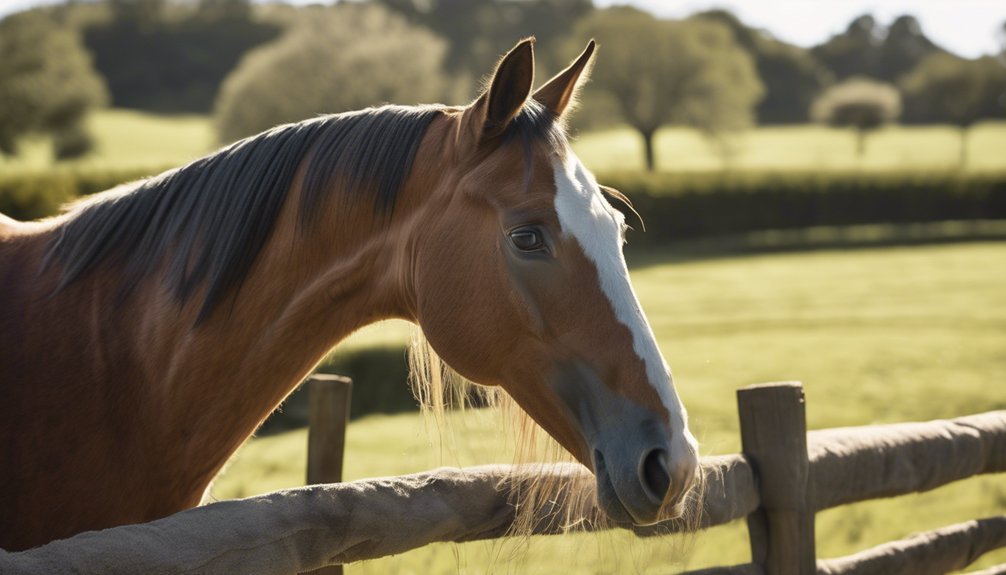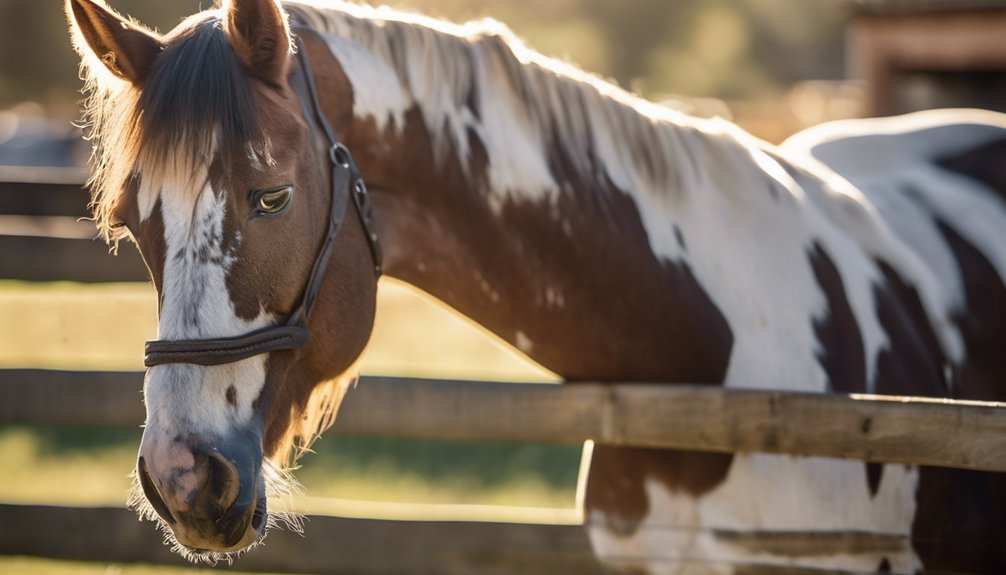
Did you know that nearly 30% of horses experience some form of itching during their lifetime? Identifying the root cause is crucial, as it can stem from allergies, parasites, or skin conditions. Effective management requires a combination of treatments and preventative measures tailored to your horse's specific needs. Understanding these factors can significantly improve your horse's comfort and quality of life. Let's explore the various aspects that contribute to this common issue.
Key Takeaways
- Identify potential environmental triggers, such as dust, pollen, or grooming products, that may be causing your horse's itching.
- Conduct allergy testing with a veterinarian to pinpoint specific allergens and manage seasonal reactions effectively.
- Regularly check for parasites like lice, mites, and worms, and consult a veterinarian for appropriate treatment if found.
- Inspect your horse's skin for signs of infections or conditions like fungal or bacterial dermatitis for early intervention.
- Use soothing natural remedies, topical treatments, and maintain a balanced diet to support your horse's skin health.
Understanding the Causes of Itching in Horses

When you notice your horse itching, it's essential to understand that various factors could be at play. Itching triggers can range from environmental elements like dust and pollen to specific grooming products that may irritate your horse's skin.
You might also find that certain feeds contribute to skin sensitivity, leading to discomfort. Pay close attention to your horse's environment; changes in bedding or turnout conditions can exacerbate these issues.
Additionally, pests such as flies or mites can cause significant irritation. By closely observing your horse's behavior and any patterns in their itching, you can pinpoint potential causes.
Understanding these factors will guide you in making informed decisions to alleviate your horse's discomfort and ensure their overall well-being.
Identifying Allergies as a Source of Itching
Allergies can be a significant source of itching in horses, often manifesting as localized or widespread discomfort.
To identify if allergies are the culprit, you should consider allergy testing. This process can pinpoint specific allergens affecting your horse, helping you tailor a management plan.
Pay attention to seasonal reactions; many horses react to pollen or certain grasses during specific times of the year. You might notice increased itching when these allergens are prevalent, indicating a possible seasonal allergy.
Observing patterns in your horse's behavior and symptoms is crucial. By keeping a detailed record, you can provide valuable information to your veterinarian, facilitating effective diagnosis and treatment options.
Addressing these allergies promptly can improve your horse's comfort and overall well-being.
Recognizing Parasites and Their Impact

Parasites are a common yet often overlooked cause of itching in horses. Effective parasite identification is crucial for addressing this issue. Understanding the parasite lifecycle helps you recognize when your horse might be infested. Common culprits include lice, mites, and worms, each impacting your horse's comfort differently.
| Parasite Type | Symptoms |
|---|---|
| Lice | Intense scratching |
| Mites | Hair loss, scabs |
| Bots | Irritated skin |
| Worms | Weight loss, colic |
Regularly check your horse for signs of these parasites and consult a veterinarian for proper diagnosis and treatment. By being proactive, you can significantly enhance your horse's well-being and comfort.
Common Skin Conditions That Lead to Itching
Itching in horses can also stem from various skin conditions that may arise independently of parasites. Common issues include fungal infections, which often present as localized patches of hair loss and inflammation. These infections thrive in damp environments, so be vigilant in maintaining dry conditions.
Bacterial dermatitis is another frequent culprit, characterized by red, swollen areas and sometimes oozing lesions. This condition often occurs when the skin barrier is compromised, allowing bacteria to invade.
It's vital to identify the underlying cause of these conditions early on. Regularly inspect your horse's skin and consult your veterinarian for accurate diagnosis and treatment options. Addressing these skin issues promptly can help restore your horse's comfort and well-being.
Evaluating Environmental Factors

Multiple environmental factors can contribute to itching in horses, making it essential to assess their surroundings.
Start by evaluating the bedding materials in your horse's stall. Dusty, moldy, or poorly maintained bedding can trigger allergic reactions or skin irritations. Choose clean, dust-free options to minimize exposure.
Next, consider your pasture management practices. Overgrazing or inadequate drainage can lead to the proliferation of irritants like weeds, parasites, or stagnant water, all of which may exacerbate itching.
Regularly rotate pastures and keep them clean to maintain a healthy environment. By understanding and improving these environmental aspects, you can significantly reduce your horse's discomfort and enhance their overall well-being.
Your attention to detail in these areas is crucial for their comfort.
Effective Treatment Options for Itching
After assessing environmental factors that may contribute to your horse's itching, it's important to explore effective treatment options.
You might consider natural remedies like aloe vera or coconut oil, which can soothe irritated skin and reduce inflammation. These options are gentle and often well-tolerated by horses.
Additionally, topical treatments containing hydrocortisone or antihistamines can provide quick relief from itching. Applying these directly to the affected areas can help alleviate discomfort and promote healing.
Regularly grooming your horse can also be beneficial, as it removes irritants and stimulates healthy skin.
Home Remedies for Immediate Relief

When your horse experiences discomfort from itching, several home remedies can provide immediate relief. Here are some effective options you can try:
- Oatmeal baths: Soothing and anti-inflammatory, they can calm irritated skin.
- Aloe vera: Known for its healing properties, applying it directly can soothe redness and discomfort.
- Coconut oil: This natural moisturizer can prevent dryness and irritation.
- Apple cider vinegar: Diluted with water, it can help balance the skin's pH and reduce itching.
- Cold compress: Applying a cold compress can provide instant relief from inflammation.
These remedies are simple to implement and can make a significant difference in your horse's comfort.
Always monitor your horse's reaction and consult a vet if symptoms persist.
Preventive Measures to Reduce Itching
To effectively reduce itching in horses, implementing preventive measures is crucial. Start with proper dietary considerations, ensuring your horse receives balanced nutrition to support skin health. Additionally, grooming techniques play a vital role; regular brushing removes dirt and loose hair, preventing irritation.
Here's a simple table outlining key preventive measures:
| Measure | Importance |
|---|---|
| Balanced Diet | Supports skin health |
| Regular Grooming | Removes irritants |
| Environmental Control | Minimizes exposure to allergens |
When to Consult a Veterinarian

Even with preventive measures in place, some horses may still experience persistent itching that warrants professional attention.
Recognizing the right time to consult a veterinarian is crucial for your horse's well-being. Look for these signs:
- Intense scratching or rubbing against objects
- Skin lesions or hair loss
- Unusual changes in horse behavior, such as aggression or withdrawal
- Signs of emergency, like swelling or bleeding
- Persistent itching lasting more than a few days
If you notice any of these symptoms, don't hesitate to reach out to your vet.
Early intervention can prevent further complications and help your horse regain comfort. Trust your instincts; your horse relies on you to keep them healthy and happy.
Frequently Asked Questions
Can Diet Affect My Horse's Itching?
Yes, your horse's diet can influence itching. Certain dietary supplements may help alleviate symptoms, while others could trigger allergic reactions. Monitoring their nutrition and adjusting as needed can significantly improve their comfort and overall health.
How Can I Soothe My Horse's Skin Naturally?
To soothe your horse's skin naturally, consider using herbal remedies like calendula or chamomile. Dilute essential oils such as lavender or tea tree oil in a carrier oil for a comforting massage that promotes healing.
Are There Specific Breeds More Prone to Itching?
Some horse breeds, like the Arabian and Thoroughbred, have a genetic predisposition to skin issues, making them more prone to itching. Understanding these itchy breeds helps you care for your equine companion more effectively.
Does Weather Impact Horse Itching Severity?
Yes, weather significantly impacts horse itching severity. Seasonal changes and humidity levels can exacerbate skin irritation, making it essential for you to monitor these factors and adjust your horse's care accordingly to minimize discomfort.
What Products Should I Avoid for My Itchy Horse?
When it comes to your horse's comfort, avoid products containing harmful chemicals and known allergy triggers. They can worsen itching and lead to more problems. Always choose gentle, natural alternatives for effective relief without adverse effects.
Conclusion
In the quest for your horse's comfort, addressing itching requires a keen eye and proactive measures. By uncovering the hidden triggers, whether they be mischievous pests or pesky allergens, you can restore your horse's joy. Embrace effective treatments and nurturing home remedies to soothe their skin like a gentle breeze on a warm day. Remember, should the itch persist, consulting a veterinarian is a wise step toward ensuring your equine companion's well-being in their tranquil pasture.





